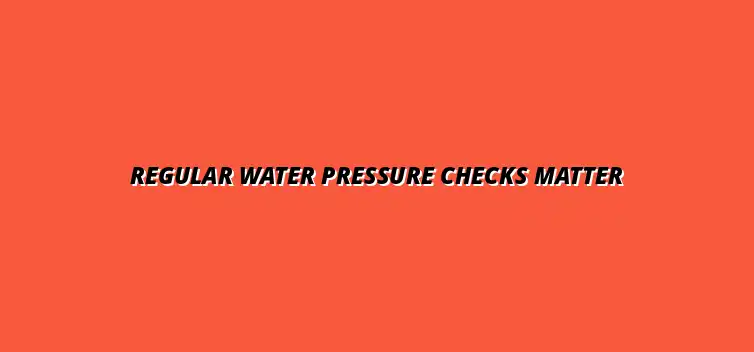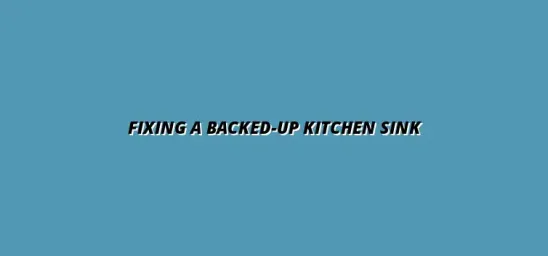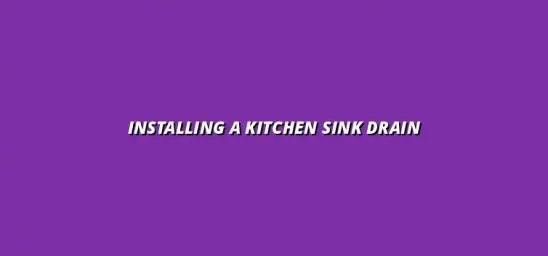
Regular Water Pressure Checks Matter
The Significance of Regular Water Pressure Checks in Your Home
Understanding the importance of regular water pressure checks in your home can lead to better maintenance of your plumbing systems. Water pressure plays a crucial role in how effectively your household systems operate. By keeping an eye on your water pressure, you can help prevent costly repairs and ensure everything runs smoothly!
Many homeowners overlook water pressure, but it can have significant effects on daily life. Regular checks can catch problems early, allowing for easy fixes before they escalate into bigger issues. So, let’s dive deeper into why this is such an important aspect of home maintenance!
Understanding Water Pressure and Its Impact on Household Systems
Water pressure refers to the force that pushes water through your pipes. It’s measured in pounds per square inch (PSI), with a typical range for residential homes being between 40 and 60 PSI. Knowing the right pressure for your home means you can maintain a comfortable and efficient water flow.
High or low water pressure can significantly affect your plumbing systems. For instance, high pressure can cause leaks or bursts, while low pressure can make it hard to take showers or perform household chores. Understanding how water pressure works helps homeowners maintain a healthy plumbing system. If you're experiencing issues with your kitchen sink, for example, you might need to fix kitchen sink water pressure to restore proper flow.
Defining Water Pressure: What Homeowners Need to Know
Water pressure is the measure of how much force is behind the water flowing through your pipes. It's essential for ensuring that water reaches all areas of your home sufficiently. Low water pressure can lead to frustrating situations, such as weak showers or slow water filling in your bathtub.
On the other hand, too much pressure can lead to serious problems. Here are some key points to remember about water pressure:
- Normal residential water pressure ranges from 40 to 80 PSI.
- Pressure below 40 PSI can indicate problems with your plumbing system.
- Exceeding 80 PSI can strain pipes and appliances, leading to leaks.
The Role of Water Pressure in Plumbing Efficiency
Water pressure is vital to plumbing efficiency. If your pressure is too low, it can disrupt the flow needed for various tasks like washing dishes or doing laundry. This can lead to a less convenient home experience. Older pipes can be particularly susceptible to issues related to water pressure; learn more about old pipes and water pressure issues.
Moreover, keeping water pressure in check helps increase the lifespan of your appliances. Appliances like dishwashers and washing machines perform best when water pressure is within the recommended range. Regularly checking ensures that your systems work efficiently and reliably!
Health and Safety Considerations: Why Water Pressure Matters
Water pressure isn’t just a convenience; it’s also a matter of health and safety. High water pressure can lead to plumbing issues like leaks, which can cause significant water damage to your home. It's crucial to address any irregularities promptly to maintain a safe living environment. Regular inspections can help prevent plumbing leaks.
Additionally, fluctuating water pressure can impact the quality of water you receive. Inconsistent pressure might lead to contamination risks, especially if your plumbing system is compromised. This highlights the importance of regular checks to ensure safe, clean water flows through your home.
Potential Risks of High Water Pressure on Plumbing Systems
High water pressure can put a strain on your plumbing systems, leading to several potential risks. Here are some issues to be aware of:
- Increased risk of pipe leaks or bursts.
- Damaged appliances due to excessive force.
- Higher water bills from unnecessary water waste.
By checking your water pressure regularly, you can prevent these problems before they start. Keeping it within the recommended range can protect your home and your wallet! Understanding how to check your pressure relief valve is also a crucial aspect of water pressure management.
How Low Water Pressure Affects Daily Activities
Low water pressure can create annoying problems in your everyday life. For example, it can make simple tasks like washing your hands or taking a shower frustrating. This can lead to feelings of inconvenience, especially when you're trying to complete chores quickly. Sudden drops in water pressure can be particularly disruptive; learn how to fixing sudden water pressure drops.
Here are some common ways low water pressure can impact daily activities:
- Slower filling of bathtubs and sinks.
- Weak showers that make bathing less enjoyable.
- Difficulty in using multiple taps simultaneously.
Regularly checking and adjusting your water pressure can ensure a better experience in your home. After all, everyone deserves a comfortable living space!
Common Questions About Checking Water Pressure
Understanding water pressure is essential for maintaining an efficient and safe plumbing system in your home. Many homeowners have questions about what constitutes an ideal water pressure range, how often they should check it, and what signs indicate a need for immediate attention. Let’s dive into some common questions to help you better manage your home’s water system!
What is an Ideal Water Pressure Range for Homes?
The ideal water pressure for most homes typically falls between 40 to 60 psi (pounds per square inch). This range ensures you have adequate pressure for showers, faucets, and appliances without risking damage to your plumbing system. If your water pressure is consistently below 40 psi, it may be a sign of an issue that needs addressing. For regular maintenance of your water heater, consider regular bathroom water heater checks.
As seasons change, water pressure can also fluctuate. Factors such as temperature, rainfall, and overall demand in your area can impact your system. Be aware of these variations and take note of any significant changes in your water pressure.
- Normal water pressure: 40-60 psi
- Low water pressure: below 40 psi
- High water pressure: above 60 psi
Understanding Recommended Pressure Levels for Safety and Efficiency
Maintaining the correct pressure levels is crucial for your home's safety and efficiency. High pressure can cause leaks, burst pipes, and appliance damage, while low pressure may lead to inadequate water supply and inefficient appliance operation. Monitoring your water pressure ensures you stay within the recommended limits.
It's also advisable to periodically check your pressure to detect any irregularities early on. If you notice your pressure fluctuating outside the recommended range, it may indicate underlying plumbing issues that require attention.
How Often Should Homeowners Check Their Water Pressure?
Homeowners should aim to check their water pressure at least once or twice a year, especially after significant weather changes or home renovations. Regular checks can help you catch issues before they escalate into costly repairs. Establishing this routine can save you both time and money in the long run!
Moreover, there are certain indicators that suggest it may be time for an immediate water pressure check. If you experience weak water flow, hissing noises from pipes, or frequent appliance malfunctions, don’t hesitate to test your water pressure. For plumbing assistance in Billesley, Birmingham, consider contacting a plumber in Billesley, Birmingham.
- Routine checks: 1-2 times per year
- Immediate checks if you notice:
- Weak water flow
- Unusual noises from plumbing
- Frequent appliance issues
Establishing a Routine Maintenance Schedule
Creating a schedule for regular water pressure checks can help you stay on top of your home maintenance. Consider setting reminders on your phone or marking your calendar to ensure you don’t forget. This simple practice will contribute to the longevity of your plumbing system and appliances!
Additionally, keep detailed records of your checks and any changes in water pressure. This information might be helpful if you ever need to consult a plumber about persistent issues.
Final Thoughts on the Importance of Regular Water Pressure Checks
Regularly checking your water pressure is one of those essential yet often overlooked aspects of home maintenance. By being proactive, you can uncover potential problems early and maintain a safe and efficient plumbing system. This not only protects your investment in your home but also enhances your daily life!
Emphasizing the Long-term Benefits of Regular Maintenance
Through effective water pressure management, you can create a sustainable home environment. Optimal water pressure not only safeguards your plumbing system but also contributes to energy and water conservation. This is a win-win for both your wallet and the environment!
Integrating water pressure checks into your overall home maintenance routine can help ensure that your home runs smoothly. By staying vigilant, you can enjoy all the conveniences of modern plumbing without the headaches that come from neglecting these important checks.
Creating a Sustainable Home Environment Through Water Pressure Management
Incorporating regular checks will set you on a path toward sustainability. Whether it’s reducing water waste or prolonging the life of your appliances, small actions can lead to significant results. I encourage you to take charge of your home maintenance today!
Additionally, consider sharing your knowledge and experiences with neighbors and friends. The more awareness there is about the importance of water pressure checks, the better equipped we all are to maintain our homes efficiently.
Encouraging Proactive Home Ownership for Better Water Efficiency
Being a proactive homeowner means staying informed and taking action to maintain your home. Water efficiency starts with understanding how your plumbing works, and regular pressure checks play a vital role. Take the time to educate yourself and prioritize your home’s plumbing health!
Don’t underestimate the power of community! Sharing tips and experiences with others can enhance awareness around the essential maintenance tasks that often get overlooked. Together, we can foster a culture of proactive home ownership that benefits everyone!





Fixing a Backed-Up Kitchen Sink
Prepare Your Plumbing for Weather
Installing a Kitchen Sink Drain
When to Replace Plumbing Fixtures
Fixing a Jammed Garbage Disposal